
An all-female thesis defense committee
A PhD student and four faculty members reflect on the role gender has played in their lives as engineers—and the progress the field has made.

A PhD student and four faculty members reflect on the role gender has played in their lives as engineers—and the progress the field has made.
EXPERTS:
Even now, in 2022, we wouldn’t be shocked to hear that a doctoral thesis committee would be a room full of men—the PhD candidate and all four professors. A room full of women, however, and we’re not sure if it’s happened in engineering before. Because Rackham Graduate School doesn’t track gender in this way, we don’t know for certain whether the committee assembled by Emma Brannon, a PhD candidate in chemical engineering, is the first or not. But we do know for every woman on the committee, this is a first.
Their experiences vary widely, reflecting different times and cultures, influenced by locations, colleges and lab leaders. They have been agents of change, and they have benefited from mentors who also sought to build positive cultures. And they each excel in areas that relate to Brannon’s project.
In the lab of Lola Eniola-Adefeso, a University Diversity and Social Transformation Professor of Chemical Engineering, Brannon explores different kinds of biodegradable particles and how they can be used to treat acute inflammatory diseases with an injection. This includes sepsis, commonly known as blood poisoning, and acute respiratory distress syndrome, an aggressive form of lung inflammation, currently best known for its role in severe COVID-19.
Brannon’s committee includes Eniola-Adefeso and three other professors with complementary expertise:
Brannon recognizes the importance of surrounding herself with people who believe in her potential for success, and who will help her lay the groundwork for it. Even as an undergraduate student, she saw both kinds of people in science—people who supported and nurtured her interest and ability, and others who discouraged her.
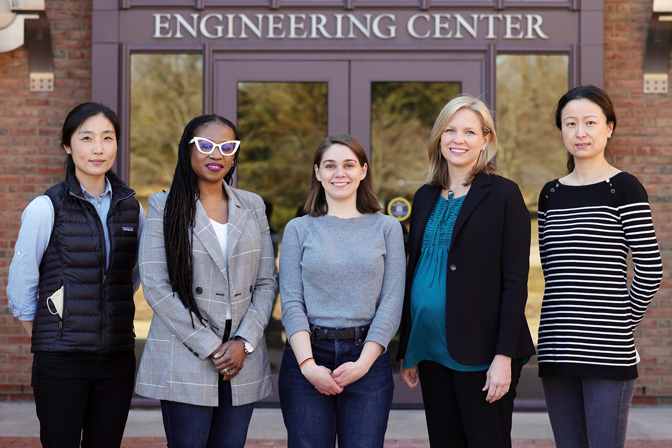
Brannon arrived at the University of Georgia with her eyes wide open about the inequities that women face. She’d experienced abuse at the hands of a boyfriend, and she knew what it was like to not be believed. She then observed the gender dynamics at the University of Georgia, how the female faculty taught larger course loads. When she began dreaming of grad school, three of her male professors told her that she wasn’t cut out for a place like Michigan—even though she’d done well in their classes.
“I guess they thought I was too fragile, I was too emotional, I wouldn’t be able to handle the stress of a scary faculty advisor from a school like Michigan. Which, I mean, it hurts when you have your engineering core professors telling you something like that,” said Brannon.
But while she understood the likelihood of encountering unfairness, she loved science. The lab where she worked as an undergraduate helped her rebuild self-esteem that had been crushed by an abusive relationship. As she persevered through challenges until she found solutions, she felt a sense of accomplishment.
“That rush of excitement when you get things right that really helps to build your confidence back up and make you feel like you belong,” said Brannon.
That lab, run by Vincent Starai, an associate professor of microbiology, also showed her the power of good mentorship.
“Sometimes things wouldn’t go as I planned, and I’d just go and sit and talk to him, and sometimes I’d even cry. And he would just… I don’t know, he was very supportive in terms of, ‘Well, it’s not working, so let’s figure this out. What’s the next step?’” she said.
When she sat down with her committee for the first time in February, virtually over Zoom, she knew that she’d made the right choices. Not only were her committee members able to advise on various aspects of her project, but they were respectful and kind as they assessed the rigor of her research plans in the preliminary exam.
The Michigan Engineer asked each professor to reflect on the role gender has played in their careers and how they felt about serving on what could be the first all-female dissertation committee at Michigan Engineering.
Eniola-Adefeso says she didn’t even notice that the committee was all female until Brannon pointed it out.
“You get desensitized to these things over the years,” said Eniola-Adefeso.
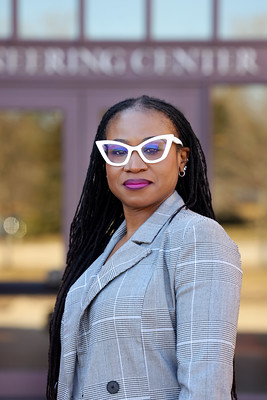
But then she and Brannon started talking about Brannon’s experiences. Reflecting on her own, Eniola-Adefeso remembered putting up with perverted jokes in her grad school study group. They’d remark on “Lola” as a porn star name, search it on porn sites. Eniola-Adefeso would move the conversation along, back to the homework.
“In their minds, these guys, we’re buddies. They don’t see anything wrong with it,” she said. And while it rankled a little, she decided not to let it bother her. But she also appreciates that women shouldn’t have to put up with that kind of behavior and that it actively drives women away from engineering.
She considered how the same remarks might have affected Brannon differently, to be objectified by her study partners after experiencing sexual abuse. What was an annoyance to Eniola-Adefeso could have dredged up old trauma for Brannon. It could have been intolerable. And Eniola-Adefeso isn’t sure she could have left that study group—her “lifeline”—and still succeeded in grad school.
While the climate of the University of Pennsylvania wasn’t perfect, Eniola-Adefeso’s PhD advisor chose to cultivate diversity and inclusion in his lab. She now recognizes that his choice to make his group welcoming and friendly, and more representative of the population at large, defined her experience.
“Graduate school is hard,” said Eniola- Adefeso. “The lab was my world…The environment where I spent most of my time should be a comforting environment, so I feel plugged in, not biased against.”
Even with that environment, even with her natural confidence, Eniola- Adefeso was nervous enough that she couldn’t keep the tremor out of her voice as she presented her thesis to her own defense committee. But only for the first fifteen minutes or so. The questions kept coming, and she had the answers. And she had her advisor, with his unfailing support and belief in her ability.
When Eniola-Adefeso applied to join the faculty in the department of chemical engineering at U-M, she would become one of four women. That number has doubled to eight now.
“Each interview was very painful actually,” said Eniola-Adefeso. “I felt like a student going into 10 thesis committee exams in the space of two weeks.”
Looking out into each room dominated by white and Asian men, she watched the women for indicators of the department climate. How well did they seem to integrate with the rest of the faculty? Did they smile? Were there any at all? Especially knowing that she would join a department with one or no other Black engineers, it was important to her to have the support of other women.
“I didn’t want to be the only one on both counts,” she said. “I didn’t want an added social stress of not feeling like I belong.”
Now, running her own research group, she tries to recreate the experience she had in grad school, where she says she had the best time of her life. She’s aware of how her presence on each committee reduces the stereotype threat that women and students of color face. Stereotype threat is essentially an extra layer of stress due to the risk of confirming stereotypes about women or people of color—or both.
Talking with other professors about the challenge of seeing Black, female engineers through to graduation, she described how preliminary exams—like the one Brannon passed last year—become insurmountable barriers when students experience stereotype threat. Feeling pressure to overturn assumptions of inferiority can harm their performance. They may not respond as well to aggressive questioning, which challenges students to overcome a professor’s doubt about their capabilities.
While her white colleagues have seen female students of color “get decimated” in preliminary exams, ending their graduate school careers, Eniola-Adefeso hasn’t seen this herself. She attributes some of that to her own identity.
“It’s not possible for students in any committee I sit to experience a harsh environment like that, which is why we should hire more diverse faculty,” she said.
She wondered if Brannon might experience stereotype threat, too, given her history of harmful encounters with men. But she is glad that it won’t be a factor on her PhD committee—and that Brannon had the courage to run with a committee composition that is out of the ordinary.
Looking back at her PhD committee twelve years ago, Wen says an all-male committee was so routine that she didn’t reflect on the make-up of hers.
Growing up in a family without much money, and an only child due to China’s one child policy, she considers herself lucky to have made it to college. She found community there—the five young women in chemical engineering were all assigned to the same dorm room. They became a tight-knit group, working through their degrees together.
“First gen,” the phrase for students who are the first generation in their families to earn degrees, wasn’t a buzzword in higher ed yet. It was only in hindsight that she realized what a hard thing she’d done, coming to the University of Illinois Urbana-Champaign to do a PhD, with support from her parents limited by distance, the language barrier, and their unfamiliarity with engineering and academia.
“At the four-year college level, and then the first three years or so of PhD training, these are, in my opinion, very critical stages,” said Wen.
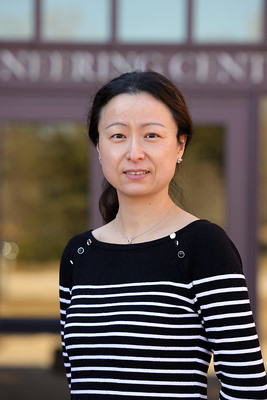
These were the stages in which she leaned most heavily on her network of other women, and she is glad to see more role models and mentors for the next generation. About a quarter of the students in her PhD lab were women, and Wen relied on them to teach her the ropes, building her confidence and competence in research. By the time she moved on to her postdoc at Stanford, the much smaller fraction of women—about one in twenty—didn’t bother her.
When she arrived at U-M, there were already five other female faculty members in the department of chemical engineering. But unlike Eniola-Adefeso, who deliberately chose a department with women, Wen describes the influence of gender on her choice as more subtle.
“The female presence, I think that plays a significant role subconsciously. I felt very comfortable, versus if I had meetings with only men all day, I’d feel more guarded and intense,” said Wen.
Wen has benefitted from their experiences, getting advice on handling sexism from students, for instance, and mapping out career paths available to her. Still, she is often the only woman on thesis committees, where she makes an effort to put the PhD candidate at ease. In a sense, she’s the committee member she wishes she’d had on her own committee.
“Someone there to encourage them and calm down their nerves, I think it helps students to actually perform better,” said Wen. “That’s something I consciously do.”
For Brannon, she has both high hopes and high expectations. “She is a very smart student. All we need to do is provide room and support,” said Wen. “I think that if I were in her shoes, I would feel very empowered.”
Kelly Arnold had a female role model on her thesis committee, and she also counts herself lucky to have always had wonderful male mentors and encouraging parents. Even so, academia’s reputation made her doubt that the faculty lifestyle was going to be for her. She knew she wanted a big family. She didn’t know if that was going to be compatible with a culture in which research and teaching come before all else.
But after she finished her postdoc at MIT in immune cell communication, her husband encouraged her to go on campus visits to see what was out there. One of those visits was to Michigan, where Alec Gallimore, the Robert J. Vlasic Dean of Engineering, addressed her concerns by telling her about family leave without her needing to broach the question.
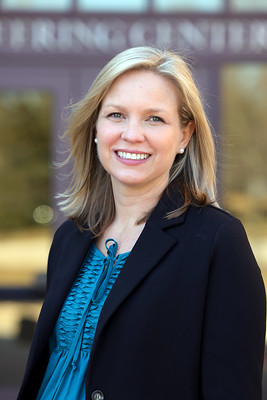
“It made me feel very hopeful. I could do it, or I could at least give it a shot,” she said. “I felt like I could at least try to do both, and try to enjoy both—and I have really enjoyed it so far. And it has been challenging, but it’s also really rewarding.”
She embraced faculty life, starting a lab to answer the questions that interested her. Why are some women more susceptible to HIV infection than others? How can we understand differences in people’s immune responses to vaccination? What is the role of the immune system in lung diseases like asthma, pulmonary fibrosis and chronic obstructive pulmonary disease?
“Probably the number one reason I love academia is just the freedom. The freedom to be creative and to pursue research that you think is interesting. The freedom to develop new courses and new educational materials based on research,” said Arnold.
In addition, she loves diversity in all its dimensions, including researchers from many disciplines and the spectrum of professional experience from undergraduates—who are the very beginning of specialization—to renowned experts.
Arnold has maintained her lab through the arrivals of three children, enabled in part by the break in her teaching duties after each birth, with a fourth expected later this year. She’s been able to keep asking and answering her questions in science because the structure of faculty life has changed to better accommodate childbearing and caregiving.
As Arnold is the faculty member from outside chemical engineering, Brannon benefits from her knowledge of computational models of immune system behaviors—which Brannon will build and use to interpret her experiments.
Jouha Min counts herself lucky that her parents believe in gender equity. In South Korea, it would not have been uncommon for them to save their resources to launch the careers of her two younger brothers rather than her own. But they sent her to the U.S. to pursue her bachelor’s degree at Cornell. She followed that with a PhD at the Massachusetts Institute of Technology. As a postdoc at Harvard Medical School, she invented a diagnostic device for breast cancer, which she is now trying to commercialize through her start-up company.
In addition to the start-up and the promise of her new position, 2020 brought Min an unexpected pregnancy. This shifted her start date at U-M from January 2021 to the fall. Senior female faculty recall a culture in which an unexpected pregnancy at such a critical stage would be expected to derail her career, but Min has felt strong support from her new colleagues. Rather than anticipating her failure, they seem invested in her success.
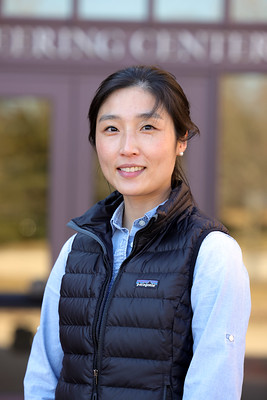
“People in my department were very understanding. I could feel that they really care,” said Min, “They try to help me in every aspect as I navigate through this new journey as a parent and also as a junior faculty.”
Min is excited to be on Brannon’s PhD committee, noting that while it feels special, she hopes an all-female committee will become as routine as all-male committees. Like Eniola-Adefeso, she did her PhD in the lab of a professor who made an effort to bring people from all walks of life into research, particularly undergraduates who might need exposure to research before they would consider grad school. But unlike the other three women on the committee, Min’s advisor wasn’t a white or Asian man. Hers was Paula Hammond, the first woman and first person of color to head MIT’s Department of Chemical Engineering.
In Hammond’s lab, Min is particularly grateful for the opportunity to learn how to be a mentor and manager even as a graduate student.
“I had that very unforgettable experience. Looking ahead to my role at the University of Michigan, I wish I could make such a commitment to really encourage and empower students from diverse backgrounds,” said Min.
While women are conventionally socialized to be nurturing, Min describes the men on her committee as also providing the kind of support she hopes to provide as a scientist—offering expertise and insight rather than judgment and doubt. Even so, she recognizes that gender equity isn’t guaranteed, and she sought out talks and workshops where women in the field spoke openly about navigating the challenges of having a family while also working as a research professor. Min hopes that she may pass that knowledge, and lessons from her own experiences, on to Brannon.
“Whether she wants to pursue her career in academia or industry, I can definitely give her some guidance because I have some experiences in both spaces,” said Min. “I wish she could succeed as a female scientist, wherever she ends up.”
And Brannon may ask for guidance. She would like to become a professor herself one day, but she knows it’s a long road. The first leg of that journey begins with this project, her foray into independent research.
After her initial meeting with her committee, the one that would determine whether she continued as a PhD student, Brannon seemed both relieved and buoyed. She’d fielded the questions, settling into the confidence that she knew most about her own project. Now, it’s a matter of trying the experiments she planned, working out the kinks, asking for help when she needs it, and bringing her results back to the same committee in a couple more years.
Reactions from social media:
Did you have an all-female prelim committee? Let us know on Twitter.
I have been on an all female committee with Prof. Nadine Sarter, Prof. Ella Atkins, and Prof. Jessie Yang (@Jessie_YangXi). Love to hear of others!
— Prof. Leia Stirling (@LeiaStirling) March 16, 2022